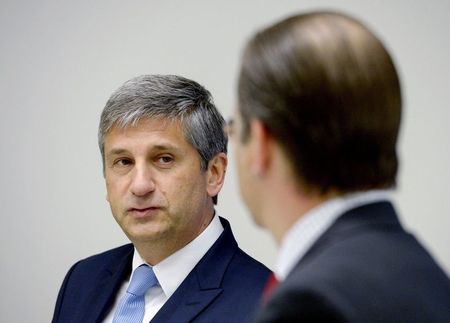By Ingrid Melander and Martin Santa
LUXEMBOURG (Reuters) - The European Union will review its fiscal rules at the end of this year to see if they can be made simpler and tweaked to encourage growth and jobs after years of budget consolidation.
Planned since the rules were tightened in 2011, at the height of the debt crisis, the review will focus on whether those changes have worked and if countries are now coordinating economic policies better.
The European Commission, which has to complete the review by Dec. 14, can propose changes to the laws in reports sent to EU governments and the European Parliament. While the review is unlikely to lead to changes to the complex set of rules used to monitor economies and their adherence to targets, it could be critical at shifting how they are interpreted.
"It's what we have had in mind, an evaluation of the whole question," Austrian Finance Minister Michael Spindelegger said on Friday on entering a monthly meeting of EU ministers, adding that "the detail and the question whether we need so many rules and complicated calculations is critical".
The review will also look at whether the fiscal framework aids economic growth and job creation - a key argument made by Italy, which takes over the rotating presidency of the EU from July and will be involved in preparing the review.
The International Monetary Fund has called for the Stability and Growth Pact to be simplified and EU Economic and Monetary Affairs Commissioner Olli Rehn and the chairman of the euro zone's finance ministers, Jeroen Dijsselbloem, have said there is room to do so.
Euro zone finance ministers agreed on Thursday that EU budget rules should not be changed again after major revisions in 2005, 2011 and 2013, but that governments should fully use the leeway already built into the Stability and Growth Pact.

Because the review will be tackled by a new European Commission, which should take office on Nov. 1, the approach to how EU fiscal rules are interpreted has become a bargaining chip in talks on the new head of the EU executive.
Italy hasn't yet given its support to leading candidate Jean-Claude Juncker, seeking a more pro-growth interpretation of the rules. Without the backing of Italy, Juncker's candidacy might be blocked by a minority coalition led by Britain.
(Additional reporting by Annika Breidthardt; Writing by Jan Strupczewski; Editing by Catherine Evans)
